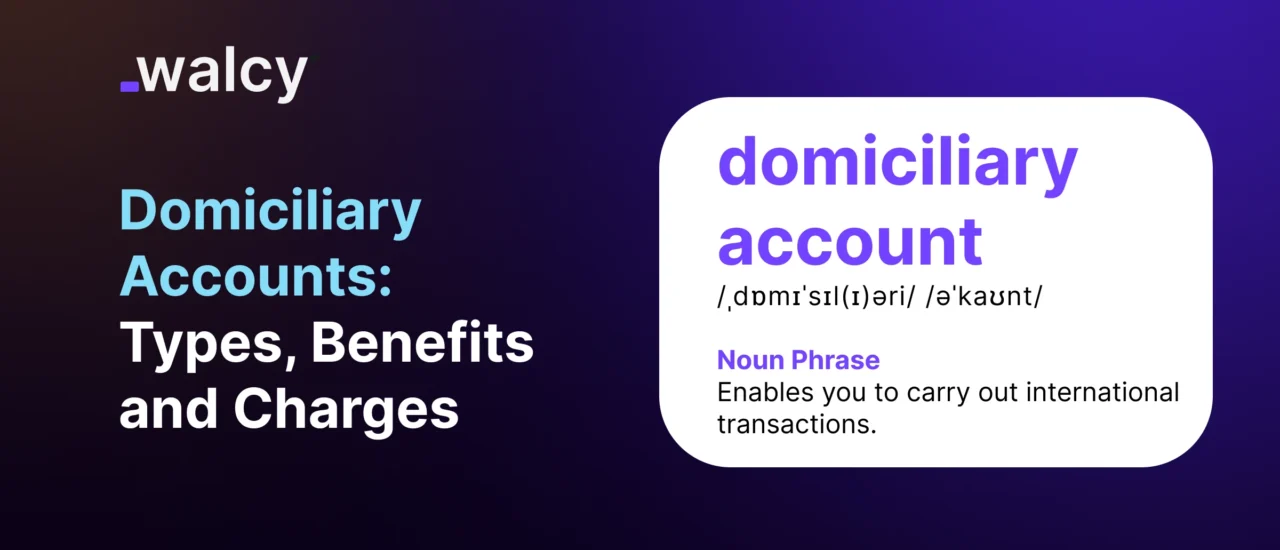A domiciliary account is a foreign currency bank account that allows individuals and business organizations to hold and carry out transactions in various currencies, like the USD, GBP, or EUR.
It thus offers a convenient way of managing foreign currency transactions without the hassle of frequent conversions. Domiciliary accounts provide that critical account for people who regularly deal in foreign currencies, whether for personal use or business transactions.
This, therefore, helps protect your funds from local currency fluctuations. In this blog, we look at the advantages, requirements, and types of domiciliary accounts. We will equally provide some key insights for individuals and businesses.
What is a Domiciliary Account?
Domiciliary accounts, also known as Dom accounts, are special bank accounts used for depositing, withdrawing, and transferring money in foreign currency.
It best suits those who receive international remittances or aim to carry out some form of foreign currency transactions.
Domiciliary accounts works just like a normal bank account, whereby the money is kept and traded in a different currency from the local currency, like US Dollars or Euros.
For obvious reasons, such accounts are very useful to people and entities that carry on import and export business, in that such would save them the headaches associated with dealing in different currencies.
Added to this is the fact that a domiciliary accounts often comes with improved rates of exchange and lower fees for international transfers, which is another reason many people and businesses like handling multiple currencies.
Types of Domiciliary Accounts
There are majorly two kinds of domiciliary accounts:
Individual Domiciliary Accounts
This account is for personal purposes, through which an account holder can receive and conduct transactions in foreign currency: remittances, international purchases, or foreign currency savings.
Many people open this kind of account to hedge their money against the devaluation of their local currency, which is why people who are traveling very often or have many international inward-bound remittances prefer to operate such accounts.
Besides, this account simplifies the process of buying goods and services from international vendors without resorting to high conversion fees. Many banks also offer attractive rates of interest on the balances maintained in these accounts, therefore providing a way to grow savings in foreign currencies.
Corporate Domiciliary Accounts
This account targets businesses that deal in foreign currencies. A corporate domiciliary account aids the company in carrying out cross-border transactions, paying for its imports, and receiving payment for its exports.
It reduces the cost of currency conversions and avoids the losses that may result from the changes in the foreign exchange rate. They help firms hold money in different currencies, thereby enabling business deals in the same currencies in which their suppliers or customers may be maintaining their accounts.
In addition, having a corporate domiciliary account will enhance a company’s credibility in international trade since it depicts the commitment to commencing engagement with global markets.
Benefits of a Domiciliary Accounts
The opening of a domiciliary accounts comes with some added advantages, including the following:
Convenience in International Transactions
Operating a domiciliary account enables one to efficiently receive and issue funds internationally without all the hassles caused by changing currencies.
This is very helpful if someone travels abroad often or does business in foreign countries, for it would make the payment process easier and much quicker than would be possible with the use of other traditional methods.
Stability of Currency
Having funds kept in foreign currencies helps a domiciliary account protect your savings against the devaluation of local currency. This feature of the account is rather considered important in economies with volatile currencies, allowing account holders to protect their purchasing power in more stable currencies.
Lower Conversion Fees
The rationale for holding money in foreign currency is to save on extremely high conversion rates once the need to make an international payment or purchase arises. This will mean saving a lot of money in the process, given that they have to conduct such cross-border transactions quite frequently.
Business Efficiency
With a corporate domiciliary account, it would be easier for businesses to engage international suppliers or customers while boosting their global trading capabilities. It equally provides a better avenue for the management of foreign currency exposure, thereby reducing risks linked to currency fluctuations.
Increased Financial Flexibility
A domiciliary account allows the holder to enjoy more financial elbow room, enabling them to conduct more varied types of currencies. Indeed, this can become quite imperative for businesses operating in a variety of markets and positions them well to move quickly at fluctuations in market conditions as well as pressures from customers.
Access to Better Exchange Rates
With domiciliary accounts, many banks provide good rates of exchange for transactions, thus enabling one to obtain better terms upon conversion. The benefits will further extend to personal and business transactions through the use of better rates of exchange advantages in increasing purchasing power while reducing losses occurring from currency exchanges.
Domiciliary Account Opening Requirements
Every domiciliary account opening generally requires some necessary documents for the process. Although the requirements may vary from bank to bank, however, here are some generally required ones:
- Means of Identification: A valid government-issued ID, such as a passport or national ID.
- Proof of Address: Utility bills or any other documents indicating your current residential address.
- Bank References: This varies with different banks; some may require a referral from another bank.
- Minimum Opening Balance: Some banks have requirements, but in general, there is usually some opening balance necessary in the currency of your account, GBP, or EUR.
Extra documentation for companies may include a certificate of incorporation, a tax identification number, and a board resolution.
Charges operating a Domiciliary Account
Like in all bank accounts, charges on domiciliary accounts would always be subject to what the bank’s policy is. However, the common ones are:
- Account Maintenance Fees: These are usually charged on a monthly or quarterly basis.
- Transfer Fees: This fee includes the charges for the transfer of foreign currency to another account, mostly for international transfers.
- Withdrawal Fees: For withdrawals from a domiciliary account, especially conversions into local currency, banks could charge a fee for it.
Of course, you need to look at your bank’s specific fee structure so you know what may be assessed against you.
Reasons You Might Want to Open a Domiciliary Account
A domiciliary account, for personal or corporate use, is a great way to handle foreign currency transactions with much ease and efficiency. This will provide an avenue for one to receive money with ease from abroad for personal use. For businesses, especially those that import or export, a corporate domiciliary account will ease cross-border transactions and thus offer financial stability and flexibility of operation.
This will ultimately put you in a better position to make informed decisions regarding the type of domiciliary account, its benefits, charges, and requirements. Be it a frequent traveler, a businessman having cross-border transactions, or a saver of foreign currency, a domiciliary account can offer you unrivaled convenience and security in handling your foreign currency needs.
Read about: 5 Best International Business Accounts | Open From Anywhere
Conclusion
One of those rarest treasures in the field of finance is domiciliary accounts, which are indeed invaluable to individuals and businesses dealing in international transactions. These accounts guarantee convenience in holding and transacting foreign currencies, hedge against local currency fluctuations, and save on unnecessary currency conversion costs.
To those receiving international payments or having to make foreign transactions quite regularly, a Domiciliary Account will make your life easier with the ease of access to your funds in several currencies. From personal use to corporate needs, domiciliary accounts have flexible solutions for fitting different kinds of foreign currency needs.
It enhances global trade capability, allows for good financial planning, and provides stability even in the middle of precarious economic weather. With knowledge of the types, benefits, and requirements related to domiciliary accounts, users will be able to make knowledgeable decisions that support their international financial activities with ease and a full degree of confidence.
Read about: Best Multicurrency Account: What Is It And How It Works?
FAQs
Can I operate multiple domiciliary accounts in various currencies?
Yes, many banks will have no problem allowing the operation of several domiciliary accounts in various currencies like USD, EUR, and GBP.
What is the minimum amount required to keep a Domiciliary Account open?
It depends on the bank. Most banks require some minimum balance in the currency of the account, normally 100 dollars for USD accounts.
Can I use my domiciliary account for online purchases?
Yes, you can, for all your e-transactions that require you to pay in the currency of the domiciliary account.
Are there any tax implications of holding a Domiciliary Account?
There may be tax implications in holding funds in a Domiciliary Account, especially if one earns interest on the balance, depending on one’s country’s tax laws. You will need to consult with a professional tax expert for advice to understand how it affects you and if you have to file any reports.
How can I fund my domiciliary account?
This is usually possible through wire transfers, cash deposits, and transfers from other accounts. Other banks allow international transfers to be effected from a foreign account directly to your domiciliary account.
Do follow us on Facebook and LinkedIn, to stay connected with us.



